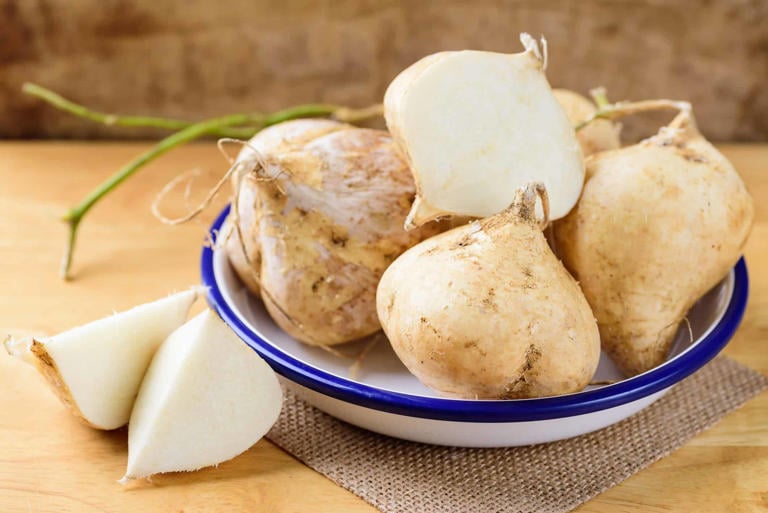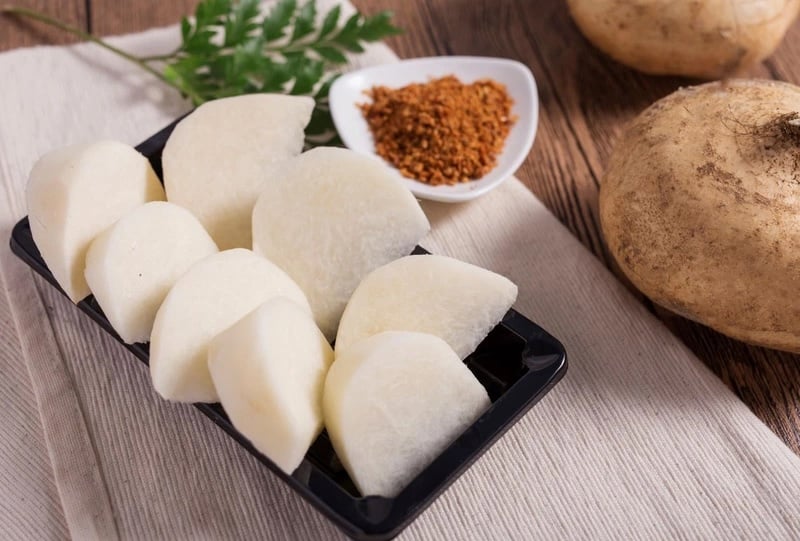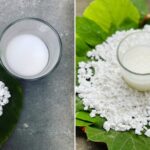Jicama, despite its resemblance to a root vegetable, is actually a member of the bean family, growing as a vine on the ground. Externally, jicama has a brown skin similar to potatoes, but its interior boasts a texture and color akin to turnips, with white flesh.
The Benefits of Jicama
Jicama is a nutritious root vegetable that offers a plethora of health benefits, positively impacting multiple parts of the body. Here are some of its notable values:
High in Fiber
Among the nutrients that jicama provides, fiber takes a prominent role. Adults require 22-34 grams of fiber daily, and jicama can help meet this requirement. According to the USDA, one cup of raw jicama offers over 6 grams of fiber, contributing to 27% of the daily fiber needs. Nutritionist Lena Bakovic from the USA highlights the benefits of adequate fiber intake for gut and cardiovascular health. She states, “Dietary fiber regulates digestion, and the prebiotics in jicama also foster the growth of beneficial gut bacteria.”

According to the USDA, one cup of raw jicama provides over 6 grams of fiber, meeting 27% of daily fiber needs.
Rich in Vitamin C
Vitamin C is a potent antioxidant that plays a crucial role in boosting immunity. Among the sources of vitamin C, jicama stands out as an excellent choice. According to Florida-based nutritionist Bonnie Roney, a serving of jicama can provide at least 20% of your daily vitamin C needs. This aids in immune support, promotes wound healing, and enhances iron absorption.
Not only is jicama rich in vitamin C, but it also contains other antioxidants such as flavonoids. These substances protect cells from the damage caused by free radicals, reducing the risk of chronic illnesses.
Promotes Heart Health
According to the US Centers for Disease Control and Prevention (CDC), heart disease is the leading cause of death in the United States. The two main contributors to heart disease are high cholesterol and high blood pressure, both prevalent among Americans. Nutritionist Roney recommends consuming fiber and antioxidant-rich foods like jicama to support cardiovascular health. She explains that the fiber in jicama can lower LDL (“bad”) cholesterol and total cholesterol. Moreover, jicama is known for its blood pressure-lowering properties, while a diet rich in antioxidants can reduce the risk of cardiovascular disease.

Nutritionist Roney recommends fiber and antioxidant-rich foods like jicama for cardiovascular health.
Jicama’s Water Retention Properties
Jicama contains approximately 90% water, making it an ideal snack and an efficient way to stay hydrated. Nutritionist Mia Syn from Charleston points out that the high water content in jicama contributes to overall health and bodily functions, such as temperature regulation and nutrient transport. While water is the best source of hydration, fruits and vegetables like jicama also play a role in providing water, according to the American Heart Association.
Weight Loss Support
Jicama is an excellent choice for those aiming to lose weight due to its low-calorie content. Explains the nutritionist, “Jicama is low in calories and high in water content, making it an ideal food for weight management.” A cup of raw jicama contains fewer than 50 calories, clearly demonstrating the weight-loss-supporting properties of this root vegetable.
Additionally, jicama helps balance blood sugar levels. According to an animal study, jicama consumption prevented spikes in blood glucose levels and limited excessive weight gain in mice fed a high-sugar diet.
Who Should Avoid Drinking Tapioca Starch Powder?
Introducing the humble yet mighty cassava powder, a traditional remedy known for its cooling properties and exceptional ability to beat the heat. But hold on, before you dive into this refreshing treat, let’s unravel the mystery of who should refrain from indulging in this seemingly wholesome delight. Uncover the hidden caveats and embark on a journey of mindful consumption with us!






































